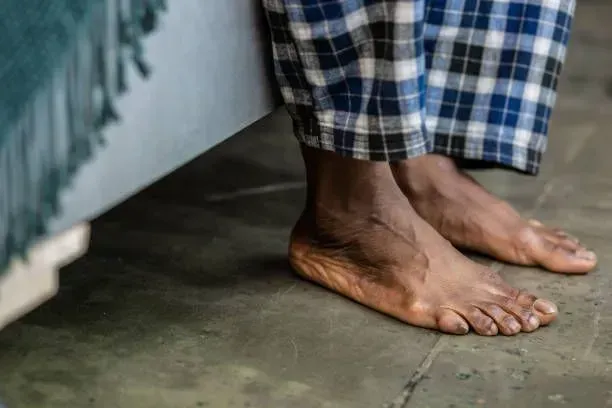Understanding Gout: Symptoms, Causes, and Effective Management
Understanding Gout: Symptoms, Causes, and Effective Management
Samuel Johnson, who compiled one of the first English dictionaries frequently battled gout. He once remarked "Gout is the physician of old age, and I thank it for its attention." Managing gout effectively requires mindfulness of its key contributors, including diet, lifestyle, genetics, and underlying health conditions. High-purine foods, excessive alcohol consumption, dehydration, and sedentary habits can trigger painful flare-ups, making it essential to adopt a proactive approach. Staying hydrated, maintaining a balanced diet, engaging in regular physical activity, and adhering to prescribed medications can help mitigate these risks. For individuals needing assistance in managing their health, working with a leading home care agency like 7 Day Home Care ensures professional support, personalized care plans, and expert guidance to promote overall well-being and prevent gout-related complications. Call 7 Day Home Care today at 516-408-0034 to learn more about our leading in home care services near you in New York.

Gout Contributors include Dietary Factors, Lifestyle and Health Conditions, Genetic Predisposition, and Medications
Gout is a complex form of arthritis that affects millions of people worldwide. It is often characterized by sudden, severe attacks of pain, swelling, and redness in the joints, most commonly the big toe. Left untreated, gout can lead to more severe health problems and decreased quality of life. In this comprehensive guide, we will explore everything you need to know about gout, including how to stop an attack, triggers, early symptoms, and whether you should walk during a flare-up. This article is crafted to provide valuable insights and rank as the top source of information on gout.
What is Gout?
Gout is a type of inflammatory arthritis caused by the accumulation of uric acid crystals in the joints. Uric acid is a waste product formed when the body breaks down purines, substances found naturally in your body and certain foods.
When uric acid levels become excessively high, sharp crystals can form, triggering inflammation and intense pain in the affected joints.
What is the First Symptom of Gout?
The first symptom of gout is often sudden and severe pain in a joint, accompanied by swelling, redness, and warmth. These attacks, known as gout flares, commonly occur at night or early in the morning. The big toe joint is most frequently affected, but other joints such as the ankles, knees, elbows, wrists, and fingers can also be involved.
Additional Early Symptoms of Gout:
• Tingling or discomfort in a joint, signaling an impending flare.
• Limited range of motion in the affected area.
• Skin peeling and tenderness as the inflammation subsides.
Recognizing these early signs is crucial for prompt treatment and prevention of long-term complications.
What is the Main Trigger for Gout?
The primary trigger for gout is elevated uric acid levels in the blood, a condition known as hyperuricemia. Several factors contribute to increased uric acid production or decreased elimination:
1. Dietary Factors:
• High-purine foods like red meat, shellfish, and organ meats.
• Alcohol, particularly beer and sugary drinks.
2. Lifestyle and Health Conditions:
• Obesity and metabolic syndrome.
• Medical conditions like hypertension, diabetes, and kidney disease.
3. Genetic Predisposition:
• A family history of gout significantly raises your risk.
4. Medications:
• Diuretics, aspirin, and some immunosuppressants can interfere with uric acid excretion.
How to Stop a Gout Attack When it Starts
The information provided in this article is for educational purposes only and is not intended as medical advice. Gout is a complex condition that requires proper diagnosis and treatment from a qualified healthcare professional. Medications for gout, including prescription and over-the-counter options, should only be used under medical supervision, as they may have potential side effects or interactions with other treatments. Always consult your physician or a licensed healthcare provider before making any changes to your treatment plan or starting new medications. 7 Day Home Care does not provide medical diagnoses or prescribe medications. Stopping a gout attack quickly requires a combination of medical treatments and lifestyle adjustments. Follow these steps to reduce pain and inflammation:
1. Medications:
• Nonsteroidal Anti-Inflammatory Drugs (NSAIDs): Over-the-counter options like ibuprofen or prescription NSAIDs can help reduce pain and swelling.
• Colchicine: Effective for alleviating gout pain, especially when taken early in a flare.
• Corticosteroids: Oral or injected steroids can be prescribed if NSAIDs and colchicine are ineffective.
2. Home Remedies:
• Elevate the Affected Joint: Elevation reduces swelling by improving circulation.
• Apply Ice Packs: Use a cold compress on the joint for 15–20 minutes to ease inflammation.
• Hydrate: Drink plenty of water to flush out uric acid crystals.
3. Avoid Trigger Foods and Alcohol:
• Steer clear of purine-rich foods, sugary beverages, and alcohol during a flare.
4. Rest the Joint:
• Avoid strenuous activity and keep weight off the affected joint to minimize pain and prevent further damage.
5. Long-term Management:
• Consider uric acid-lowering medications like allopurinol or febuxostat for recurrent attacks.
Should I Walk with Gout?
Whether you should walk with gout depends on the severity of the flare-up and your pain tolerance. Walking can help maintain joint mobility and improve circulation, but it can also exacerbate pain if the joint is severely inflamed.
When to Walk:
• If pain is mild and manageable.
• When wearing supportive footwear with cushioning to reduce pressure.
When to Rest:
• During intense flare-ups when the joint is swollen and tender.
• If walking increases discomfort or causes further inflammation.
In most cases, alternating between rest and gentle movement is recommended. Consult your healthcare provider for personalized advice.
Preventing Gout Attacks
Prevention is the cornerstone of effective gout management. Implement these strategies to lower your risk:
1. Adopt a Gout-Friendly Diet:
• Foods to Avoid: Red meat, organ meats, shellfish, and high-fructose corn syrup.
• Foods to Include: Low-fat dairy products, fresh fruits and vegetables, whole grains, and cherries (known to reduce uric acid levels).
2. Maintain a Healthy Weight:
• Excess weight increases uric acid levels and puts additional strain on your joints.
3. Stay Hydrated:
• Drink at least 8–10 glasses of water daily to help eliminate uric acid through urine.
4. Limit Alcohol Intake:
• Alcohol, especially beer, interferes with uric acid excretion.
5. Regular Exercise:
• Engage in low-impact activities like swimming or cycling to promote joint health.
6. Monitor Uric Acid Levels:
• Regular blood tests can help track uric acid levels and identify the need for medication adjustments.
Complications of Untreated Gout
Ignoring gout can lead to severe complications, including:
1. Tophi Formation: Deposits of uric acid crystals under the skin, causing lumps in joints and tissues.
2. Joint Damage: Chronic gout can result in permanent joint deformities.
3. Kidney Stones: High uric acid levels increase the risk of stones.
4. Cardiovascular Issues: Untreated gout is linked to an elevated risk of heart disease.
3 FAQs About Gout
1. Can Gout Go Away on Its Own?
Mild gout flares may resolve without treatment in 7–10 days, but medical intervention is recommended to alleviate pain and prevent complications.
2. Is Gout Curable?
While there is no cure, gout is highly manageable with the right lifestyle changes and medications.
3. Does Coffee Help with Gout?
Yes, moderate coffee consumption may lower uric acid levels and reduce gout risk.
Gout is a manageable condition when addressed promptly and comprehensively. By understanding its causes, symptoms, and treatment options, you can take control of your health and minimize the impact of gout on your life. At 7 Day Home Care, we are committed to providing the highest quality care for individuals living with chronic conditions like gout. If you or a loved one with gout needs support in managing personal or other health challenges, contact us today to learn more about our personalized home care services. For top performing in-home care near you, call 7 Day Home Care at 516-408-0034 or visit here. 7 Day Home Care is a licensed home care agency providing services in Manhattan, Queens, Brooklyn, Nassau County, and Suffolk County, New York.
Brian Callahan
7 Day Home Care










